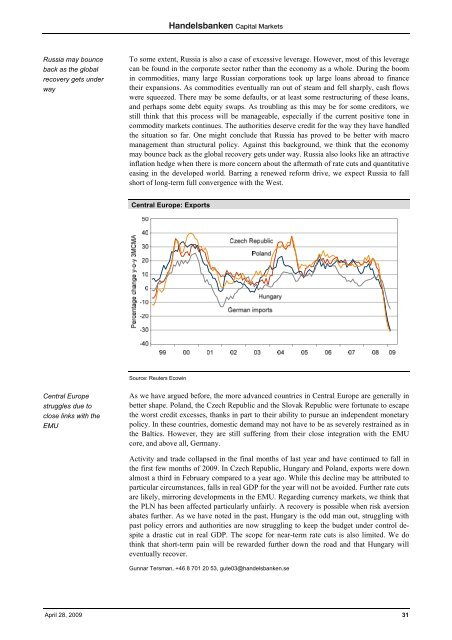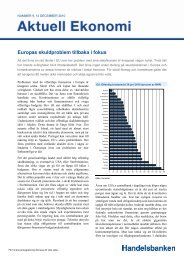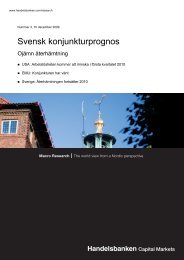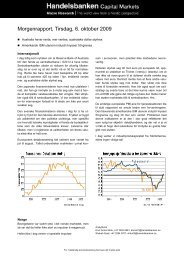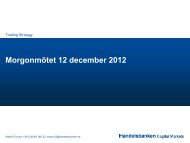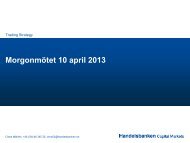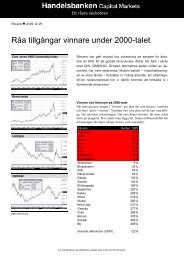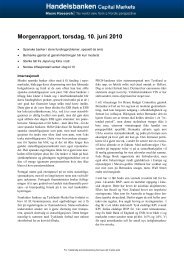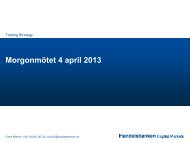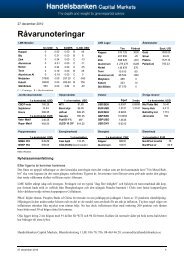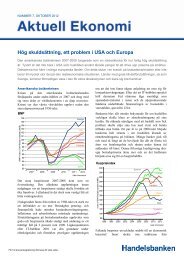Download - Macro Research - Handelsbanken
Download - Macro Research - Handelsbanken
Download - Macro Research - Handelsbanken
You also want an ePaper? Increase the reach of your titles
YUMPU automatically turns print PDFs into web optimized ePapers that Google loves.
Russia may bounce<br />
back as the global<br />
recovery gets under<br />
way<br />
To some extent, Russia is also a case of excessive leverage. However, most of this leverage<br />
can be found in the corporate sector rather than the economy as a whole. During the boom<br />
in commodities, many large Russian corporations took up large loans abroad to finance<br />
their expansions. As commodities eventually ran out of steam and fell sharply, cash flows<br />
were squeezed. There may be some defaults, or at least some restructuring of these loans,<br />
and perhaps some debt equity swaps. As troubling as this may be for some creditors, we<br />
still think that this process will be manageable, especially if the current positive tone in<br />
commodity markets continues. The authorities deserve credit for the way they have handled<br />
the situation so far. One might conclude that Russia has proved to be better with macro<br />
management than structural policy. Against this background, we think that the economy<br />
may bounce back as the global recovery gets under way. Russia also looks like an attractive<br />
inflation hedge when there is more concern about the aftermath of rate cuts and quantitative<br />
easing in the developed world. Barring a renewed reform drive, we expect Russia to fall<br />
short of long-term full convergence with the West.<br />
Central Europe: Exports<br />
Source: Reuters Ecowin<br />
Central Europe<br />
struggles due to<br />
close links with the<br />
EMU<br />
As we have argued before, the more advanced countries in Central Europe are generally in<br />
better shape. Poland, the Czech Republic and the Slovak Republic were fortunate to escape<br />
the worst credit excesses, thanks in part to their ability to pursue an independent monetary<br />
policy. In these countries, domestic demand may not have to be as severely restrained as in<br />
the Baltics. However, they are still suffering from their close integration with the EMU<br />
core, and above all, Germany.<br />
Activity and trade collapsed in the final months of last year and have continued to fall in<br />
the first few months of 2009. In Czech Republic, Hungary and Poland, exports were down<br />
almost a third in February compared to a year ago. While this decline may be attributed to<br />
particular circumstances, falls in real GDP for the year will not be avoided. Further rate cuts<br />
are likely, mirroring developments in the EMU. Regarding currency markets, we think that<br />
the PLN has been affected particularly unfairly. A recovery is possible when risk aversion<br />
abates further. As we have noted in the past, Hungary is the odd man out, struggling with<br />
past policy errors and authorities are now struggling to keep the budget under control despite<br />
a drastic cut in real GDP. The scope for near-term rate cuts is also limited. We do<br />
think that short-term pain will be rewarded further down the road and that Hungary will<br />
eventually recover.<br />
Gunnar Tersman, +46 8 701 20 53, gute03@handelsbanken.se<br />
April 28, 2009 31


